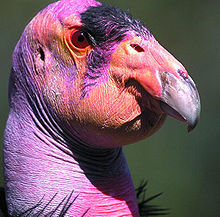Cathartiformes
| Cathartiformes Temporal range: Eocene to present
| |
|---|---|

| |
| California condor | |
| Scientific classification | |
| Kingdom: | Animalia |
| Phylum: | Chordata |
| Class: | Aves |
| Clade: | Accipitrimorphae |
| Order: | Cathartiformes Coues, 1884 |
| Subtaxa | |
| |
The order Cathartiformes /kəˈθɑːrtɪfɔːrmiːz/ of raptors or birds of prey includes the New World vultures and the now-extinct Teratornithidae.[1] These raptors are classified by most taxonomic authorities in the order Accipitriformes (which includes the eagles and hawks). In the past, they were considered to be a sister group to the storks of the order Ciconiiformes based on DNA–DNA hybridization and morphology.[2][3]
References[]
- ^ Chatterjee, Sankar; Templin, R. Jack Jr.; Campbell, Kenneth E. (July 24, 2007). "The aerodynamics of Argentavis, the world's largest flying bird from the Miocene of Argentina". Proceedings of the National Academy of Sciences. 104 (30): 12398–12403. doi:10.1073/pnas.0702040104. PMC 1906724. PMID 17609382.[failed verification]
- ^ Ligon, J. David. "Relationships of the cathartid vultures." (1967).
- ^ Sibley, Charles Gald & Ahlquist, Jon Edward (1990): Phylogeny and classification of birds. Yale University Press, New Haven, Conn.
Categories:
- Birds of the Americas
- Eocene birds
- Eocene animals of North America
- Eocene animals of South America
- Paleogene birds of North America
- Paleogene birds of South America
- Neogene birds of North America
- Neogene birds of South America
- Quaternary birds of North America
- Quaternary birds of South America
- Extant Eocene first appearances
- Bird stubs